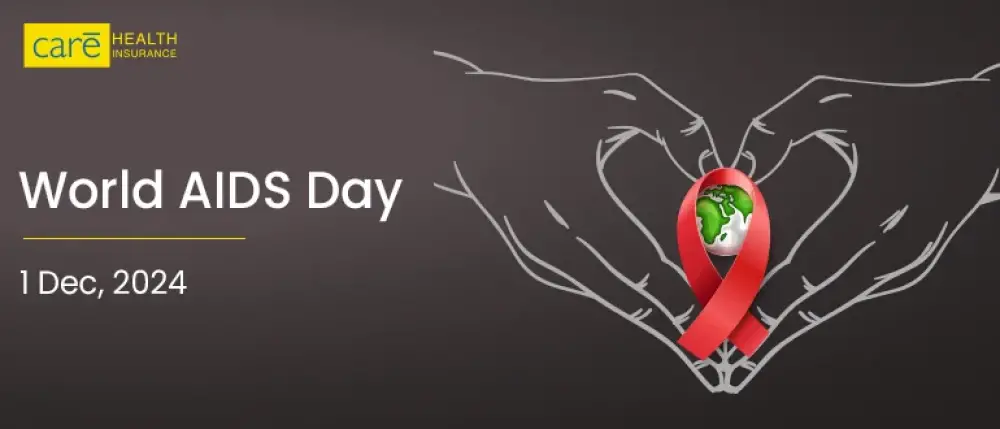Subscribe to get weekly insights
Always stay up to date with our newest articles sent direct to your inbox
Published on 27 Nov, 2024
Updated on 27 Mar, 2025
1449 Views
5 min Read

Written by Anjali Sharma
favorite0Like
favoriteBe the First to Like
World AIDS Day is celebrated on December 1 every year. The Global AIDS Day was first observed in 1988, making it one of the earliest celebrated international health days. In 2024, we will observe the 37th World AIDS Day with the theme - Take the Right Path: My Health, My Right! This is an essential event for educating people about the virus, supporting rights, and promoting prevention and treatment.
World AIDS Day discusses the real experiences of people living with HIV today. It celebrates the strength, resilience and diversity of the communities most affected.
World AIDS Day also has a significant global milestone in offering antiretroviral therapy (ART) access, raising awareness about prevention strategies, and encouraging inclusive policies to combat discrimination. World AIDS Day 2024 continues to operate as a powerful reminder of the ongoing challenges in addressing HIV/AIDS and the importance of solidarity and action to achieve the goal of ending the epidemic by 2030.
There are various activities that you can engage in to raise AIDS awareness on this day:
The global impact of the HIV/AIDS epidemic is affected by specific risk factors. However, HIV infection can be managed with access to effective prevention, diagnosis, and treatment.
Here are some of the worldwide impact measures of HIV/AIDS:
The symptoms of HIV/AIDS can vary depending on the stage of the infection. Let us discuss an overview of the symptoms of HIV/AIDS at different stages:
HIV/AIDS is transmitted through the exchange of body fluids from a person who has HIV to a person who does not.
AIDS treatment primarily focuses on managing HIV prevention for progression to AIDS and improving the quality of life. With early diagnosis and consistent AIDS treatment, many patients suffering from HIV can live long and healthy lives.
Preventing HIV/AIDS involves taking steps to reduce the risk of infection. By following these prevention strategies, individuals can greatly reduce their risk of contracting HIV.
The major difference between HIV and AIDS is that HIV is a virus that attacks our immune system, while AIDS is the most advanced stage of HIV infection.
Let us learn more about these differences in detail:
| HIV (Human Immunodeficiency Virus) | AIDS Acquired Immunodeficiency Syndrome) |
|---|---|
| A virus that attacks the immune system, particularly CD4 cells (T cells) | Severe stage of HIV infection characterised by a weakened immune system |
| Remains in body for years without significant symptoms if untreated | Develops when HIV damages the immune system |
| Flu-like symptoms in the early stages | Opportunistic infections, weight loss, and drastic immune system damage |
| Detected through blood or saliva tests | Diagnosed when the CD4 count falls below 200 |
World AIDS Day serves as a powerful reminder of the ongoing fight against HIV/AIDS. It brings awareness to the importance of prevention, testing, and treatment while honouring those who have lost their lives to the disease. By coming together on this day, we renew our commitment to ending the stigma, supporting those affected, and striving for a world free of HIV/AIDS.
Getting appropriate treatment at the right time is an essential aspect of HIV prevention. Having the right health insurance ensures you get all the treatment facilities required.
>> Also Read: HIV, Its Stages, Treatment and Prevention
Disclaimer: The above information is for reference purposes only. Kindly consult your general physician for verified medical advice. The health insurance benefits are subject to policy terms and conditions. Refer to your policy documents for more information.
favoriteBe the First to Like
Thyroid : मामूली नहीं हैं महिलाओं में थायराइड होना, जानें इसके लक्षण और घरेलू उपचार Vipul Tiwary in Diseases
शुगर कंट्रोल कैसे करे? जानें, डायबिटीज में क्या खाना चाहिए Vipul Tiwary in Health & Wellness
हाई ब्लड प्रेशर को तुरंत कंट्रोल कैसे करें? देखें इसके उपाय Vipul Tiwary in Diseases
पैरों में दर्द किस कमी से होता है? जानें, इसके घरेलू इलाज Vipul Tiwary in Health Insurance Articles
National Newborn Care Week: Every Touch, Everytime, Every Baby! Mudit Handa in Awareness Days
Pancreatic Cancer Awareness Month: Shine a Light for Early Detection! Mudit Handa in Awareness Days
Lung Cancer Awareness Month: Breaking Barriers to Champion the Cause Mudit Handa in Awareness Days
World Immunization Day: Attaining Physical and Financial Immunity Mudit Handa in Awareness Days
Living with HIV/AIDS has several challenges, including managing lifelong medication, dealing with potential side effects, coping with HIV stigma and discrimination, and maintaining mental health due to anxiety or depression.
The life expectancy of someone with HIV/AIDS has improved significantly with effective treatment. With early HIV/AIDS testing and consistent antiretroviral therapy (ART), people with HIV can live nearly as long as those without the virus. However, without treatment, HIV can progress to AIDS, which shortens life expectancy.
The latest advancements in HIV/AIDS research include the new injectable medications that provide protection for weeks or months, reducing the need for daily pills. Development of more effective and user-friendly pre-exposure prophylaxis (PrEP) options, including long-acting injections and implants.
Always stay up to date with our newest articles sent direct to your inbox
Loading...